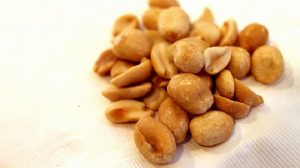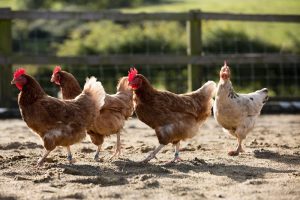Enter your address to receive notifications about new posts to your email.
Articles tagged Genetics Journal
(334 results)
-
Poisoned peanuts: insights into aflatoxin susceptibility
Expression analysis provides clues about what makes some peanut strains more susceptible to fungal toxin contamination. In 1960, 100,000 turkeys across hundreds of English poultry farms died from aflatoxin contamination in the peanut meal in their feed. Aflatoxin is a potent carcinogen produced by fungi of the genus Aspergillus, which can grow on peanuts. Although…
-
Fowl play: the genetics of chicken sociability
A new study reveals genetic changes that affect social behavior in chickens. We have a number of phrases that relate human behavior to that of chickens; for example, when you accuse someone of acting “chicken,” you’re likely calling them a coward. If someone is running around like a chicken with their head cut off, they’re…
-
ModERN treasure: hundreds of worm and fly transcription factor binding profiles cataloged
Offshoot of the modENCODE project provides crucial data and strains for understanding gene regulation. Following a multidisciplinary effort spanning six institutions, researchers working on the modERN (model organism Encyclopedia of Regulatory Networks) project have released a powerful resource for biologists studying the fruit fly Drosophila melanogaster and the nematode worm Caenorhabditis elegans. So far, report Kudron,…
-
Mito-nuclear interactions could influence disease variability
A new fruit fly model of Leigh syndrome reveals the importance of mtDNA variation. Inherited mitochondrial disorders pose a perplexing problem to researchers and clinicians: people with the same condition can have vastly different clinical manifestations, even if they share the same mutation. For example, a neurodegenerative disorder called Leigh syndrome, which can be caused…
-
Off-balance mice shed light on inner ear development
The “hyperspin” long-range enhancer deletion recapitulates disease phenotypes. In recent years, improvements in genetic testing have made it much easier to discover the causes of rare genetic diseases, but sequence data can also present new puzzles. Take split hand/-foot malformation-1 syndrome (SHFM1), which causes limb deformities, such as joined fingers, and sometimes deafness. Candidate culprits…
-
Alternative splicing tunes sex differences in flies
The Y chromosome has an unanticipated role in sex-biased intron retention in Drosophila. Differences between males and females in sexually dimorphic species stem in part from disparities in gene expression. This sex-biased expression can be achieved through numerous means, one of which is alternative splicing. In a recent study, Wang et al. investigated differences in one…
-
Do longevity genes really influence aging?
A reanalysis of genes tied to life span in mice reveals only a select few affect aging. Like it or not, you are always getting older. The mechanisms responsible for this fact of life, non-negotiable as it is, remain poorly understood. To identify genes that drive the aging process, researchers typically look for those that…
-
A new role for a signpost on the chromatin landscape
Monomethylated H3K27 is more than just an intermediate. We often talk about biological traits as if they’re written in our DNA, but some of them aren’t in our DNA at all—instead, they’re on it in the form of chemical tags on the histone proteins our genomic DNA is wrapped around. During development, each cell’s genome…
-
Heights and pitfalls in detecting polygenic adaptation
Identifying signatures of polygenic adaptation is getting easier—but a commentary calls for caution in drawing conclusions. If you’ve ever wished for a stepstool so you could see the stage at a crowded concert, or, conversely, if you’re tired of being asked “How’s the weather up there?”, you’ve likely pondered what makes some of us tall…
-
The genomic downside of greener pastures
Population data from Quebec reveals the genetic consequences of rapid human expansions. The majority of the 6.5 million French Canadians living in Quebec today can trace their heritage to just 8500 settlers who formed clusters around the Saint Lawrence River in the early 17th century. Most remained near those riverside settlements until 200 years later,…
-
Learning to peer review: program update
An update on the pilot GENETICS Peer Review Training Program, which provides early career scientists with a mentored peer review experience in which they participate in authentic manuscript reviews. The second phase of the pilot program is currently accepting applicants. As a scientific society publisher, the GSA serves our community. That’s why we are so…











